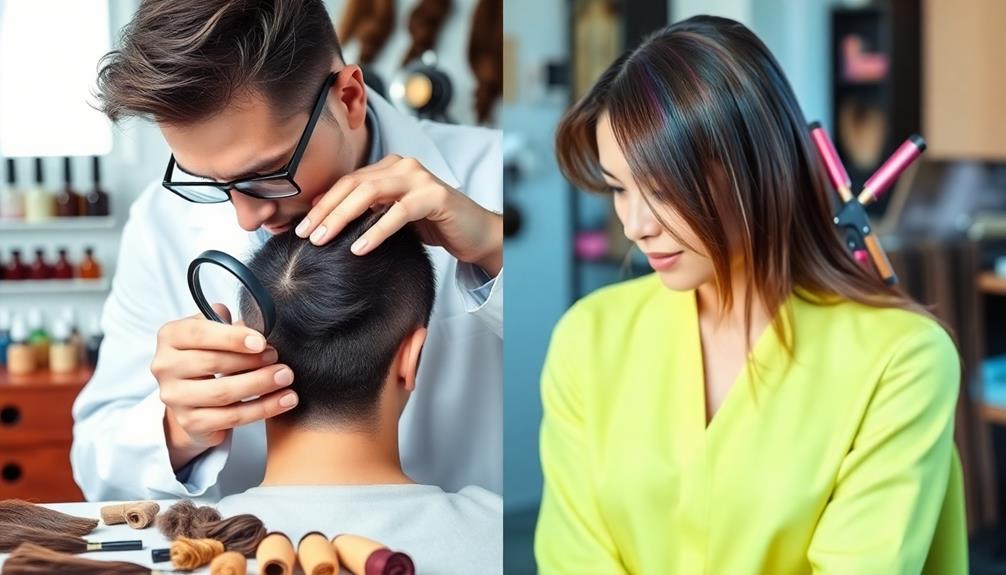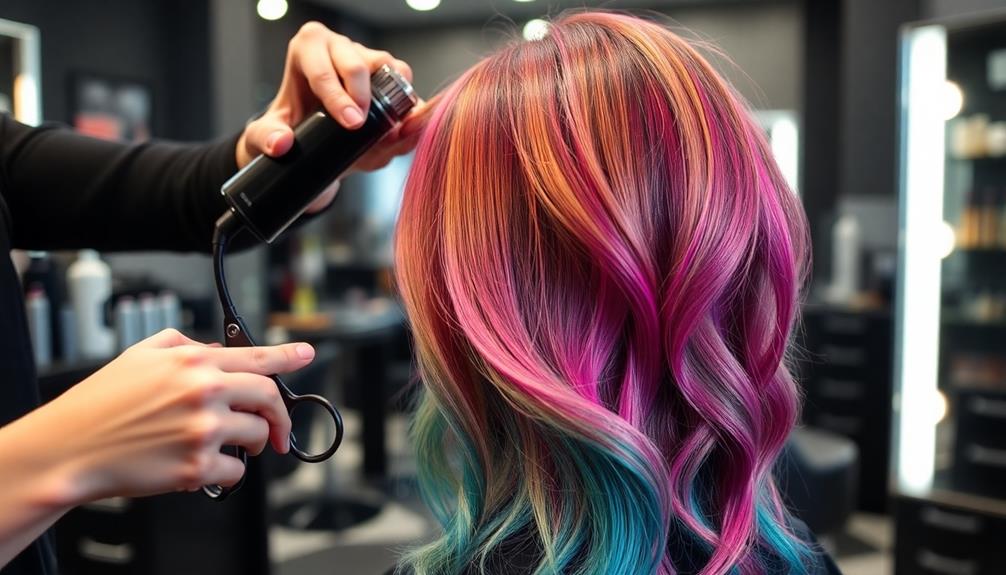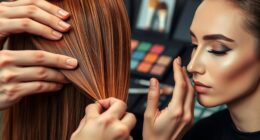When you're uncertain about your hair needs, knowing whether to see a trichologist or a stylist is key. If you notice excessive hair thinning, bald patches, or persistent scalp issues like dandruff, it's time to consult a trichologist. They specialize in diagnosing hair and scalp conditions and can provide tailored treatment plans. On the other hand, if you want a haircut, color, or styling advice, a stylist's expertise shines in aesthetic transformations. Understanding these roles helps you choose the right expert for your situation, ensuring your hair gets the care it truly needs. There's more to uncover about each expert's role.
Key Takeaways
- Consult a trichologist for hair thinning, bald patches, or persistent scalp issues like dandruff and itchiness.
- Visit a hairdresser for aesthetic transformations, such as haircuts, coloring, and styling to enhance your appearance.
- If experiencing excessive hair shedding or sudden texture changes, a trichologist can diagnose underlying health conditions.
- For hair maintenance advice and product recommendations, a hairdresser can guide you on keeping your hair healthy and stylish.
- Collaboration between trichologists and hairdressers can provide a comprehensive approach to both hair health and aesthetics.
Understanding Trichologists
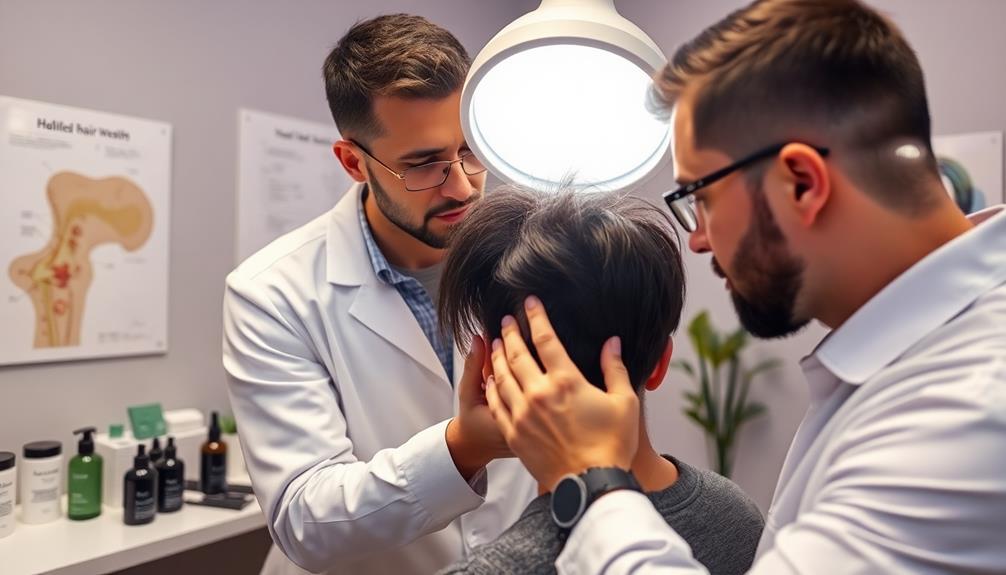
When it comes to hair health, many people don't realize the essential role trichologists play. As specialized experts, trichologists focus on diagnosing and treating various hair and scalp conditions. If you're experiencing issues like hair loss or thinning, consulting a trichologist might be your best step forward.
They undergo extensive training in the biology, anatomy, and physiology of hair, which equips them to handle a range of common conditions such as alopecia, dandruff, and itchy scalp. Additionally, just like the effectiveness of hydrocolloid patches in treating acne, trichologists are trained to provide targeted treatments that promote hair restoration.
When you visit a trichologist, they'll utilize diagnostic methods to assess your specific hair and scalp health. You'll receive personalized solutions tailored to your individual needs, ensuring you get the most effective treatment.
Their expertise goes beyond just recommending products; they'll guide you through the entire process of restoring your hair's health.
Role of Hairdressers
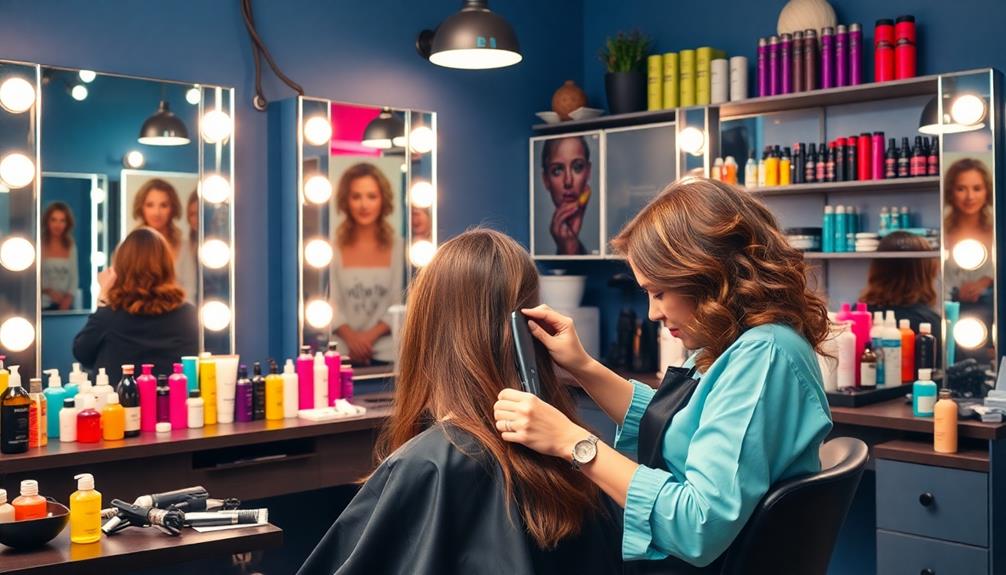
Hairdressers play a crucial role in enhancing your appearance and boosting your confidence through their creative and technical skills. They specialize in hairstyling, focusing on cutting, coloring, and various hair treatments tailored to your individual preferences.
With extensive training and certifications, hairdressers stay updated on the latest trends and techniques, guaranteeing you receive high-quality service. Additionally, they may also offer advice on maintaining hair health, including the use of vital oils for promoting hair growth, such as Rosemary oil which stimulates blood circulation.
When you visit a hairdresser, they'll collaborate with you to understand your unique style and needs. This personalized styling approach helps them create looks that not only suit you but also enhance your overall hair appearance.
Their mastery of different styling techniques allows them to transform your hair while maintaining its health and vibrancy.
However, it's important to recognize the limits of a hairdresser's expertise. While they excel in aesthetic transformations, they may refer you to a trichologist if you're facing more serious scalp conditions or hair loss issues.
This partnership guarantees you receive thorough care, addressing both the cosmetic and health aspects of your hair. So, when you want a new look or a revitalizing treatment, your hairdresser is the go-to expert for achieving stunning results.
Symptoms for Trichologist Consultation
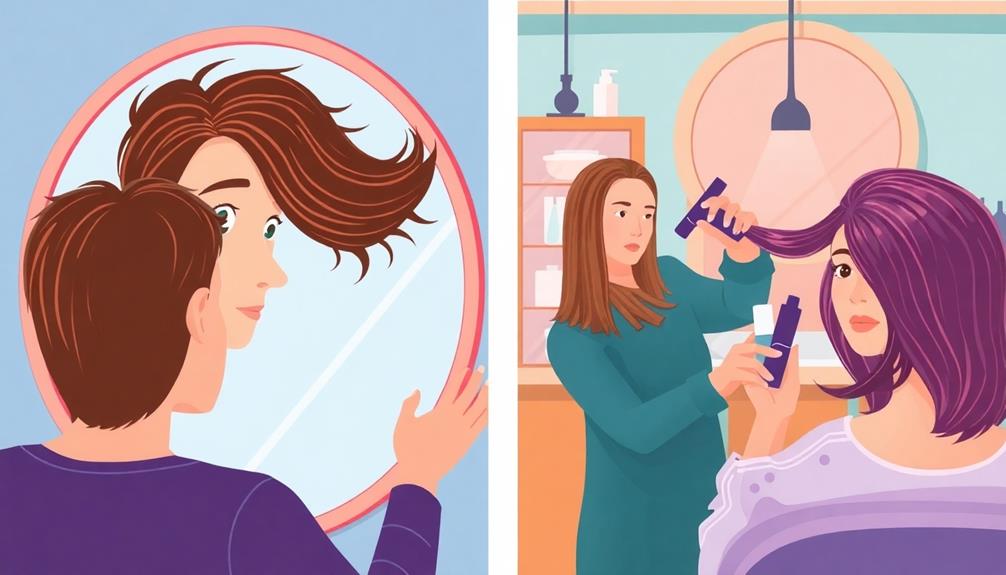
If you're noticing signs that your hair isn't as healthy as it should be, it's time to contemplate a consultation with a trichologist. Recognizing the symptoms early can make a significant difference in your hair health.
Here are some key indicators that suggest you should consult a trichologist:
- Excessive hair shedding beyond normal amounts
- Thinning hair or noticeable bald patches
- Sudden changes in hair texture or volume
- Persistent scalp issues, like dandruff or itching
- A family history of hair loss
Additionally, factors like stress can exacerbate hair issues, so incorporating calming practices could be beneficial, such as drinking herbal teas known for their anxiety relief properties.
These symptoms could point to an underlying issue that requires professional assessment and treatment. If you're experiencing hair loss related to autoimmune diseases, like alopecia areata, a trichologist can offer specialized management strategies.
Furthermore, emotional impacts from hair loss can affect nearly 50% of individuals with alopecia, making it essential to address both physical and psychological concerns.
By seeking help from a trichologist, you can take proactive steps toward restoring your scalp and hair health, ensuring you receive the care needed for your unique situation.
Don't hesitate to reach out for support when you notice these signs!
Key Differences Between Experts
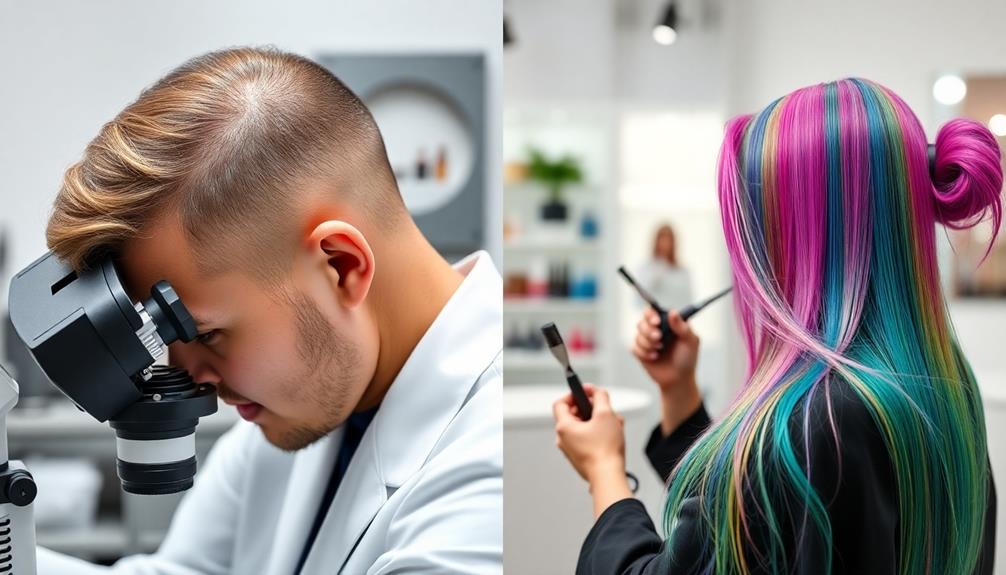
When it comes to hair care, understanding the key differences between a trichologist and a stylist can really help you make the right choice for your needs.
You'll find that trichologists have specialized training focused on diagnosing scalp and hair conditions, often utilizing holistic approaches that may include herbal tea benefits for promoting scalp health.
On the other hand, stylists are experts in cutting and coloring.
Knowing their distinct education, expertise, and treatment approaches can guide you toward the best professional for your hair concerns.
Education and Training Levels
In the domain of hair care, understanding the education and training levels of trichologists and hairstylists reveals key differences that can impact your hair health. Here's what you need to know:
- Trichologists hold certifications or diplomas focused on hair and scalp health, often studying various conditions including those related to skin texture and tone. Their expertise allows them to recommend treatments that may involve the use of products containing effective ingredients like glycolic acid for improved scalp health.
- Hairdressers complete training and apprenticeships centered around hairstyling techniques.
- Trichologists study causes of hair loss and various treatment options.
- Hairdressers emphasize creative skills in cutting, coloring, and styling hair.
- Trichologists diagnose and treat specific scalp health disorders.
While both professionals share a passion for hair, their paths diverge greatly. Trichologists dive deep into the biological and physiological aspects of hair and scalp conditions, equipping them to provide targeted treatments. Their training prepares them to address issues like hair loss with expert knowledge.
On the other hand, hairdressers excel in the artistic side of hair care. They focus on enhancing appearance through styling and product recommendations.
Focus of Expertise
Trichologists and hairdressers each bring unique expertise to the hair care field, but their focuses couldn't be more different.
A trichologist specializes in diagnosing and treating hair loss, scalp disorders, and overall hair health. They explore the biological and physiological aspects of hair, allowing them to address medical concerns effectively, much like the way navigating divorce from a narcissist requires understanding complex emotional behaviors.
If you're experiencing issues like alopecia or dandruff, a trichologist will assess your condition and recommend tailored treatment plans to help restore your hair health.
On the other hand, hairdressers focus on the aesthetic side of hair care. They excel in hairstyling, cutting, and coloring techniques, transforming your look through their artistic skills.
While they maintain and enhance the visual appeal of your hair, they don't diagnose or treat underlying health issues.
Treatment Approaches and Techniques
There's a clear distinction between how trichologists and hairdressers approach hair care treatment. When you're dealing with hair and scalp issues, understanding these differences can guide you to the right expert.
It's crucial to recognize that just as with symptoms of breast cancer, identifying early signs of hair and scalp problems can lead to more effective treatment options.
- Trichologists focus on diagnosing underlying conditions.
- Hairdressers specialize in styling products and techniques for aesthetics.
- Treatment options from trichologists often include medical interventions like minoxidil.
- Hairdressers provide consultations for achieving desired hairstyles.
- Both can collaborate to optimize your hair care.
When you visit a trichologist, expect a thorough evaluation of your scalp health and hair growth cycles. They use diagnostic tools to pinpoint issues and recommend effective treatment options tailored to your needs.
In contrast, a hairdresser assesses your hair primarily for styling and color, recommending products to enhance its appearance.
If you're looking for solutions to persistent scalp health problems, a trichologist will be your best bet. However, if it's time for a fresh hairstyle or color, your hairdresser will know just what to do.
When to See a Trichologist

When you notice noticeable hair thinning, bald patches, or sudden changes in your hair's texture or volume, it's time to consult a trichologist. These signs can indicate underlying health issues that need attention, as hair growth can be influenced by various factors including emotional and psychological growth.
If you're dealing with persistent scalp problems such as dandruff, itching, or flakiness, a trichologist can help diagnose conditions like psoriasis or seborrheic dermatitis and recommend effective treatments.
If you've recently given birth and are experiencing excessive hair fall, consulting a trichologist is essential. They can provide insights and strategies to manage hormonal imbalances affecting your hair growth.
For those facing unexplained hair breakage, a trichologist can assess your hair health, identify potential causes such as nutritional deficiencies, and suggest restorative treatments tailored to your needs.
Additionally, if you have a family history of hair loss, seeking treatment from a trichologist is advisable. Early intervention can help effectively manage and slow the progression of hair loss, preserving your hair follicles for the long term.
Don't hesitate to reach out and get expert advice tailored specifically for your hair concerns.
Benefits of Professional Consultation
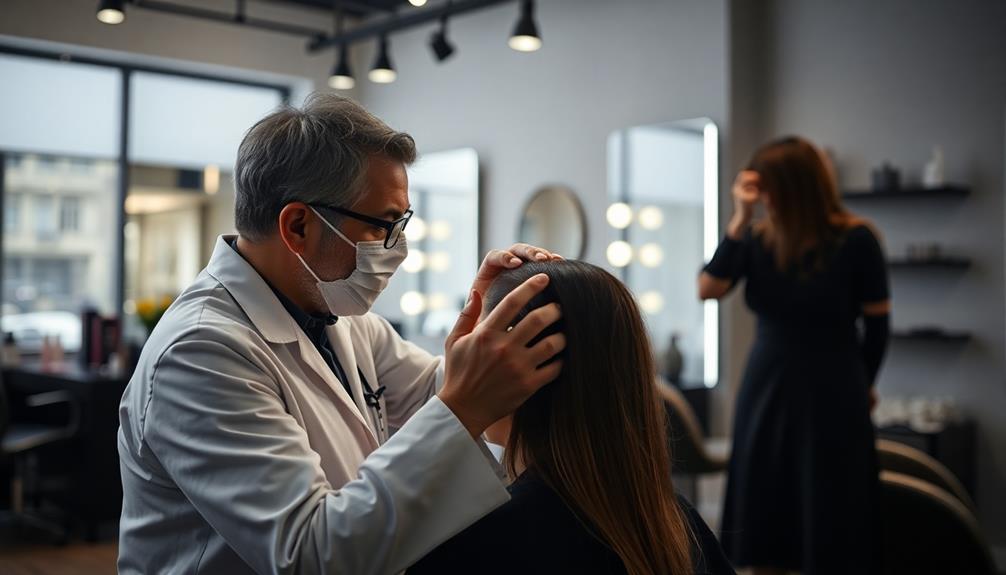
Seeking professional consultation for your hair concerns brings numerous benefits that can greatly improve your overall hair health.
When you consult a trichologist, you gain access to specialized expertise in diagnosing and treating hair and scalp issues. This is particularly important as understanding the psychological impact of hair loss can be vital for overall well-being, which aligns with the need for emotional support for families.
Here are some key advantages you'll experience:
- Tailored solutions based on your unique hair loss conditions
- Early intervention through assessment of underlying causes
- Personalized care plans, including specific product recommendations
- Emotional support to help manage anxiety and depression related to hair loss
- Holistic strategies for long-term restoration and maintenance
Choosing the Right Specialist
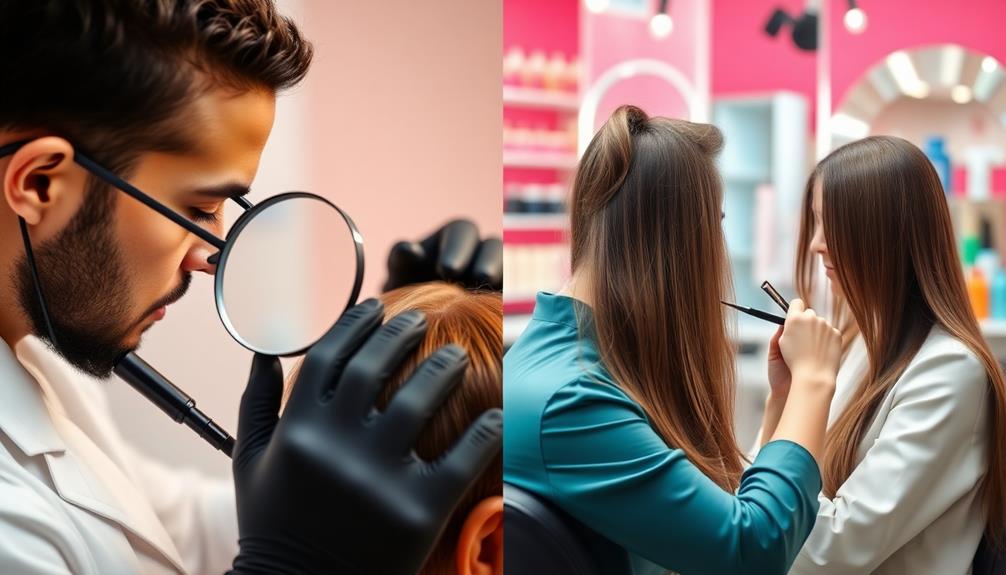
When you're facing hair concerns, it's essential to identify whether you need a trichologist or a stylist.
A trichologist specializes in diagnosing hair loss and scalp issues, often recommending best oils for hair growth to promote scalp health, while a stylist focuses on hair maintenance and aesthetics.
Understanding these differences will help you choose the right expert for your specific needs.
Identifying Hair Concerns
Choosing the right specialist for your hair concerns can make all the difference in achieving healthy locks. If you're facing issues like hair thinning, hair loss, or scalp health problems, knowing when to consult a trichologist is essential.
Understanding the importance of decentralized governance models can also shed light on how different professionals within the hair industry may operate. Here are some signs that indicate it's time to seek their expertise:
- Persistent scalp irritation or itchiness
- Unexplained hair breakage or changes in texture
- Visible hair thinning or bald patches
- Dandruff or other scalp conditions
- Concerns about underlying health or nutritional issues
Trichologists specialize in diagnosing and treating these types of concerns. They can help you understand the reasons behind hair breakage or thinning, and they'll recommend appropriate treatments tailored to your needs.
On the other hand, if your primary goal is to change your hairstyle or color, a stylist is the right expert for you. They focus on the aesthetic side, whereas a trichologist addresses the medical aspects of hair and scalp health.
Specialist Expertise Comparison
Understanding the differences between a trichologist and a stylist is essential for making informed decisions about your hair care.
If you're dealing with hair loss or scalp health issues, a trichologist is your go-to expert. They specialize in diagnosing and treating conditions like hair thinning and can provide personalized assessments to tailor treatment plans to your specific needs.
Their training focuses on scalp biology and hair disorders, allowing them to offer medical advice and recommend effective products.
On the other hand, if you're looking for a new hairstyle, a stylist is the right choice.
Stylists excel in creative hairstyling techniques, cutting, and coloring, helping you achieve your desired look while enhancing the appearance of healthy hair. They stay updated on the latest trends and products to ensure your hair not only looks great but remains strong and vibrant. It’s crucial to communicate clearly with your stylist about your preferences and any concerns, as open dialogue ensures the best possible outcome. This collaboration allows them to tailor their skills to suit your individual style and hair needs.
They may not address underlying medical concerns but can certainly help you maintain or elevate your hairstyle.
Frequently Asked Questions
Should I See a Dermatologist or Trichologist for Hair Loss?
If you're dealing with hair loss, you should first consider your situation. For medical conditions affecting your scalp, a dermatologist's expertise is essential. For targeted hair health advice, seeing a trichologist is your best option.
When Should You Visit a Trichologist?
You should visit a trichologist if you notice significant hair thinning, bald patches, or persistent scalp issues. Sudden changes in hair texture or hormonal-related hair loss also warrant expert advice for effective treatment and management.
Is It Worth Seeing a Trichologist?
Absolutely, it's worth seeing a trichologist if you're facing hair or scalp issues. Their specialized knowledge helps identify underlying causes, offering tailored treatments that can greatly improve your hair health and overall well-being.
When Should You See a Hair Specialist?
You should see a hair specialist if you notice excessive shedding, persistent scalp issues, unexplained texture changes, or specific conditions like alopecia. Early intervention can help you manage symptoms and improve your hair health effectively.
Conclusion
When it comes to your hair, knowing when to consult a trichologist or a stylist is essential. If you're dealing with persistent hair issues, don't just assume they'll resolve on their own; a trichologist can provide targeted solutions. On the other hand, if you're looking for a fresh look or a style update, a stylist is your go-to. Trust your instincts—your hair deserves the right expert, and understanding the difference can lead to healthier, happier locks.
